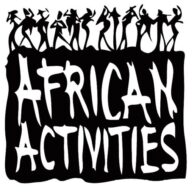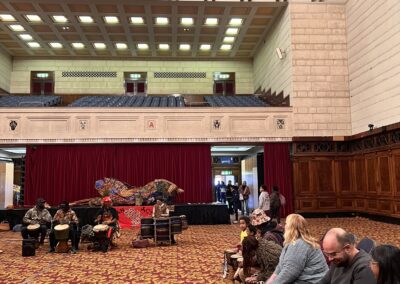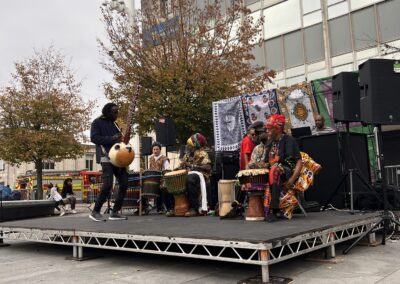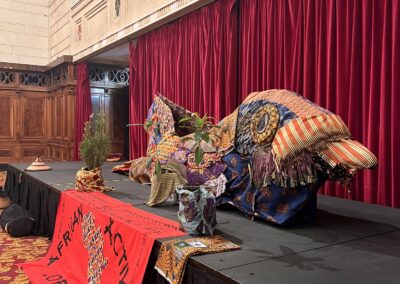Environmental Policy and Action Plan
Supporting information can be found at: www.juliesbicycle.com/resources/environmental-policyguidelines.
DRAFT 02/04/2022
Environmental Policy
African Activities offer the opportunity to engage with Black and African Culture by sharing superb creative artistic experiences that disrupt preconceptions, create community, drive excellence and break barriers. We work with nearly 300 schools a year face to face and have over 5000 organisations accessing our resources online. We support and work with 13 artists of Black Heritage across the UK.
What is your motivation for taking environmental action?
Our links to sub Saharan Africa and the diaspora make climate change personal, we see how our actions here impact on the lives of those we love elsewhere.
We wish to use our workshops and art to share the impact of climate change and use our audience reach to bring about positive collective environmental change.
We wish to reduce our costs and enhance our business resilience. Currently travel is a large cost to our organisation, it is the largest element of our carbon footprint. It is also counterproductive when there maybe talent already working in the area we are travelling to that we could nurture
What is your level of environmental ambition?
We strive to be a carbon natural organisation and to use our art and workshops to expand this mission to encourage positive collective environmental and behavioural change.
What are your main impacts, specific to the nature and size of your activities?
Our office is small but poorly insulated.
Our main impact is travel. In the UK we cover over miles a year in our core vehicle. Strong links to home and offering chances to tour and exchange knowledge are a key part of our current and future mission. International travel is common among our artists and we actively encourage it as it is beneficial for their mental health and to the creative process. We also instigate travel and cultural exchange with artists visiting the UK as with the tour of King Ayisoba and Chief Justice Abbaya.
Our drums, materials and equipment also have both a carbon and social impact.
What are your key environmental commitments given the nature and level of your impacts?
Office
- We have installed curtains and invested in a more efficient heating system.
- We have standardised our working hours to ensure people are on site together to reduce energy usage
- We have developed a paperless system of resource sharing, including cloud filing to reduced our paper usage
- We have reduced our energy and water usage this year and hope to continue to reduce it.
National travel
- In 2022 we invested in a much cleaner and more fuel efficient ULEZ complaint vehicle.
- We are committed to nurturing and expanding talent in the north, wales and Scotland to expand impact while reducing our travel needs.
- Use of the ‘tours’ model to group schools via location and encourage booking in locations to reduce travel.
International Travel
Alternative to flight travel remain high risk and difficult within West African and especially across the Sahara.
We have invested in our partner organisation Earth Child Ghana African Activities Foundation. This registered charity in Ghana purchased 35 acres in 2021 and has planted 2000 endangered rosewoods in 2022 with 5000 in the nursery. We are committed to rewilding the 35 acres of land by 2525 and to continue the process building on this success and learning from any failures.
Materials
- All of our drums are constructed from sustainable forestry and all skins are certified by the veterinary association of Ghana as being free of anthrax and not originating from any wild species.
- We encourage recycling across all of our projects and include participants within this process.
- We have a relationship with the New Forest Business Partnership to partner with hotels, guest house and restaurants across our locality to take in their old linens and dye and wash these for use in our adinkra workshops.
- We use natural sources dyes where possible including cabbage, tea, coffee and onion skin.
To develop our links with Agbogbloshie to enable children working on the site to engage in creative and play based activities drawing on a trauma informed curriculum. To develop learning materials and CPD to share the message that the ‘away’ in thrown away is a real place where people live facing the consequences of our choices.
To travel a touring plastic forest across England this summer, taking in both Camp Bestivals, the Oppidan festival and numerous scout and guide activities. To create trees from waste plastic used on site at these events. Encouraging people to think about waste, how it is used and its consequences.
Who is responsible for reviewing your environmental policy and when and how is this done?
Kwame Bakoji-Hume. Annually in March each year.
How have you developed an environmental action plan? How is it monitored, reviewed and updated, by whom and when?
We have developed a plan using resources provided by Julies Bicycle and by a collaborative process across the organisation. It is monitored and reviewed by Kwame in March each year, It is raised and discussed at our yearly summer training.
………………………………………………………………………………………………
Environmental Action Plan
Define 5 key objectives and/or targets, each with a corresponding timeframe
- Reduce carbon emissions by 10% year on year
- Zero waste to landfill in 2 years
- Planting more timber than we use within 1 year
- Sourcing 40% of workshop materials from recycled sources
- Reduce national travel by 10% year on year
|
Object/ targets |
Actions |
Responsibilities |
Deadline |
Budget |
KPI |
|
1. Reduce total volume of waste to landfill by 15% by Jan 2023 |
Introduce reuse and recycling scheme for plastic, paper and glass |
Janet Barton |
31/03/22 |
£100 |
Total volume of bin waste |
|
|
Create scrap paper box to reuse paper before recycling |
Janet Barton |
31/03/22 |
|
Total volume of recycling waste |
|
|
Use online systems to share resources rather than printing |
Janet Barton |
31/03/22 |
|
Total volume of bin and recycling waste |
|
|
Introduce rechargeable batteries |
Janet Barton |
31/03/22 |
£200 |
Number of batteries disposed of |
|
Reduce Carbon emissions year on year by 10% |
Insulate the office |
Lotte Bakoji-Hume and TFSR |
28/05/22 |
£200 |
KW of electricity used |
|
|
Install fuel efficient heating and lighting |
Lotte Bakoji-Hume |
28/04/22 |
|
KW of electricity used |
|
Reduce National Travel by 10% year on year |
Reduce the number of miles travelled with ‘tour’ bookings |
Janet Barton |
28/04/22 |
£60 monthly software |
Number of miles travelled |
|
Object/ targets |
Actions |
Responsibilities |
Deadline |
Budget |
KPI |
|
|
Talent development of local area practitioners throughout the country |
Lotte Bakoji-Hume |
01/07/22 |
500 |
2 staff trained to deliver artsmark per quarter. |
|
|
Improve the environmental strand and fuel efficiency of the van |
Kwame Bakoji-Hume |
02/04/22 |
20000 |
ULEZ compliance |
|
Plant More timber than we use |
Buy all drums from environmentally sustainable Sources listed on the Ghana Timber Transparency Portal |
Kwame Bakoji-Hume |
01/07/22 |
|
Ghana Timber Transparency Portal wood |
|
|
Plant trees |
Patrick Addeh |
01/07/22 |
|
2000 rosewood seedlings nursed for transplanting in 2023. |
|
|
Purchase of broken drums from other drumming companies for reskinning and base fixing |
Kwame Bakoji-Hume and Pape Thaim |
01/07/22 |
|
Number of drums fixed and recycled |
|
Sourcing 40% of workshop materials from recycled sources |
Use of NFDC connections to collect old linens |
Kwame Bakoji-Hume |
01/02/23 |
|
% of linen bought for adinkra workshops |
|
|
Use of vegetable dye |
Kwame Bakoji-Hume |
10/05/22 |
|
Number if synthetic dyes bought |
|
|
Use of milk bottles, old magazines and other recycled material as the basis for craft workshops |
Kwame Bakoji-Hume |
01/04/22 |
|
Number of recycling workshops held monthly |
|
Object/ targets |
Actions |
Responsibilities |
Deadline |
Budget |
KPI |
|
Encourage environmental good behaviour and change |
There is a place called away |
Kwame Bakoji-Hume |
01/09/22 |
1000 |
A body of work built over the summer to a standard that the project can be rolled out across schools nationally. |
|
|
|
|
|
|
|
|
|
|
|
|
|
|
|
|
|
|
|
|
|
|
|
|
|
|
|
|
|
|
|
|
|
|
|
|
|
|
|
|
|
|
Draft written for review at summer meeting 02/04/22
Approved by
Founder African Activities CIC







0 Comments